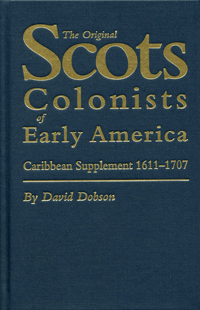 Since the earliest colonial days, Scots have immigrated to the New World in sizable numbers. In the 17th Century there were many Scottish colonies established, though some were short lived. Nova Scotia (1629), East Jersey (1683), and South Carolina (1684), are prime examples. Many of these early immigrants were religious dissidents. There were also a number of deported criminals and prisoners of war sent to the Americas during the century. However, the northern colonies, which would one day become part of Canada and the U.S., were not the only destination point of Scottish emigrants.
Since the earliest colonial days, Scots have immigrated to the New World in sizable numbers. In the 17th Century there were many Scottish colonies established, though some were short lived. Nova Scotia (1629), East Jersey (1683), and South Carolina (1684), are prime examples. Many of these early immigrants were religious dissidents. There were also a number of deported criminals and prisoners of war sent to the Americas during the century. However, the northern colonies, which would one day become part of Canada and the U.S., were not the only destination point of Scottish emigrants.
“The Scottish connection with the Caribbean started in 1611 with the voyage to the West Indies of the Janet of Leith. It was not until after 1626, however, that Scots actually settled in the Caribbean. In 1627 King Charles I appointed James Hay, Earl of Carlisle, a Scot, as Governor of the Caribbees, and this led to a steady trickle of Scots to Barbados and other islands…During the 1660s the Glasgow-based organization called the Company Trading to Virginia, the Caribbee Islands, Barbados, New England, St. Kitts, Montserrat, and Other Colonies in America established economic links with the West Indies. By the latter part of the seventeenth century, Scots merchants, planters, seafarers, and transportees were to be found throughout the English and Dutch colonies of the Caribbean. In total, it is believed that as many as 5,000 Scots settled temporarily or permanently in the Caribbean before the Act of Union in 1707… The settlement of Scots in the West Indies was important from the point of view both of the colonist and the home country. Many of the colonists used the islands as a stopping-off point before continuing on to the mainland of America, where they then settled. Alexander Hamilton and Theodore Roosevelt are numbered among those who descend from Scots who initially settled in the Caribbean”
The Original Scots Colonists of Early America: Caribbean Supplement 1611-1707, by David Dobson, lists hundreds of colonists who settled in the West Indies. The book is an extract of names and information regarding migrations, such as ship names, dates, and any other relevant information the author was able to pull from existing information. Here are a couple of examples form the book:
DOWNIE, JAMES, from Peterhead, Aberdeenshire, a Sailor on the Unicorn from Leith to Darien 14 July 1698, cnf Edenburgh 21 October 1707 [SRO.CC8.8.83]
MILLER, THOMAS, son of Baillie Thomas Miller of Stirling, a surgeon’s mate on the Hope subscribed to a deed of factory in Stirling 15 August 1699 before sailing to Darien. [SRO.GD406, bundle 162, p40/4]
This book focuses on records and information prior to the union between Scotland and England. Information for post-1707 immigration is easier to come by, making this pre-1707 extract all the more valuable. Both primary and secondary sources for this volume come from both the U.K. and the U.S. A complete list of references, both archives and publication, with associated abbreviations, can be found at the beginning of the book.
Order a copy of The Original Scots Colonists of Early America: Caribbean Supplement 1611-1707 for your library from Family Roots Publishing; Item #: GPC1472, Price: $19.60.
Some of my Scottish ancestors moved to the West Indies and exploited the trade there. One of them is the founder of Roses lime cordial drink, which is still going strong today. Sadly, not a direct ancestor………….
Seeking information on Tarton Ramsay who migrated from Scotland to Jamaica (Westmoreland) around 1750.